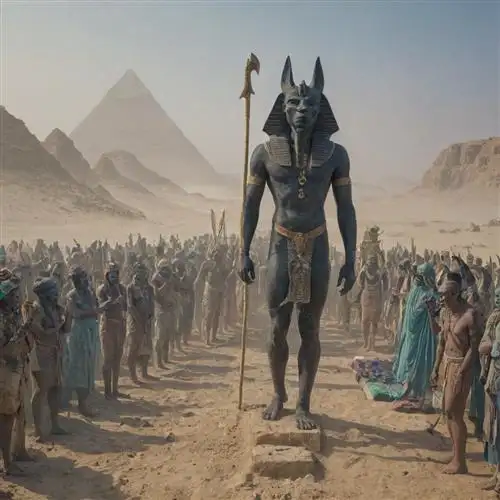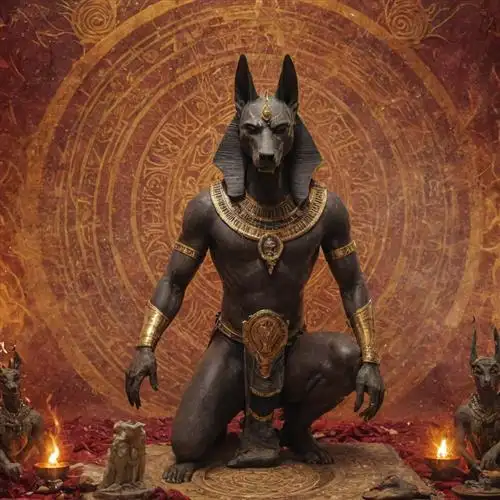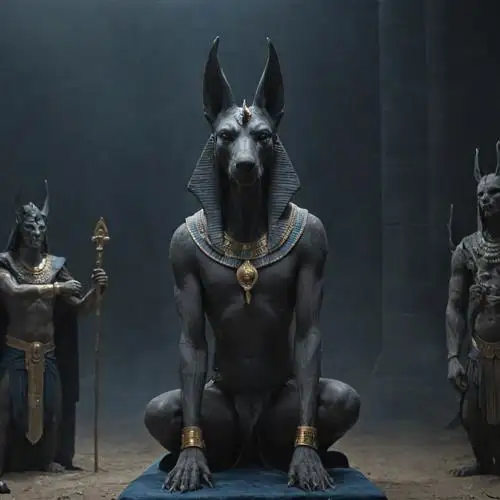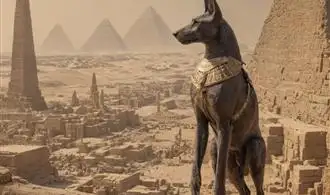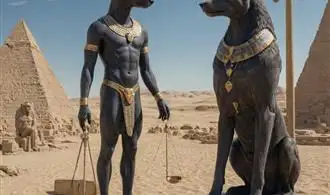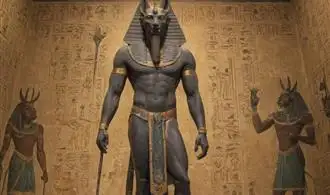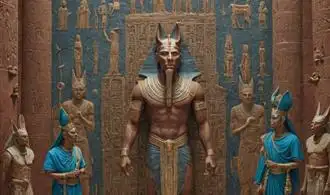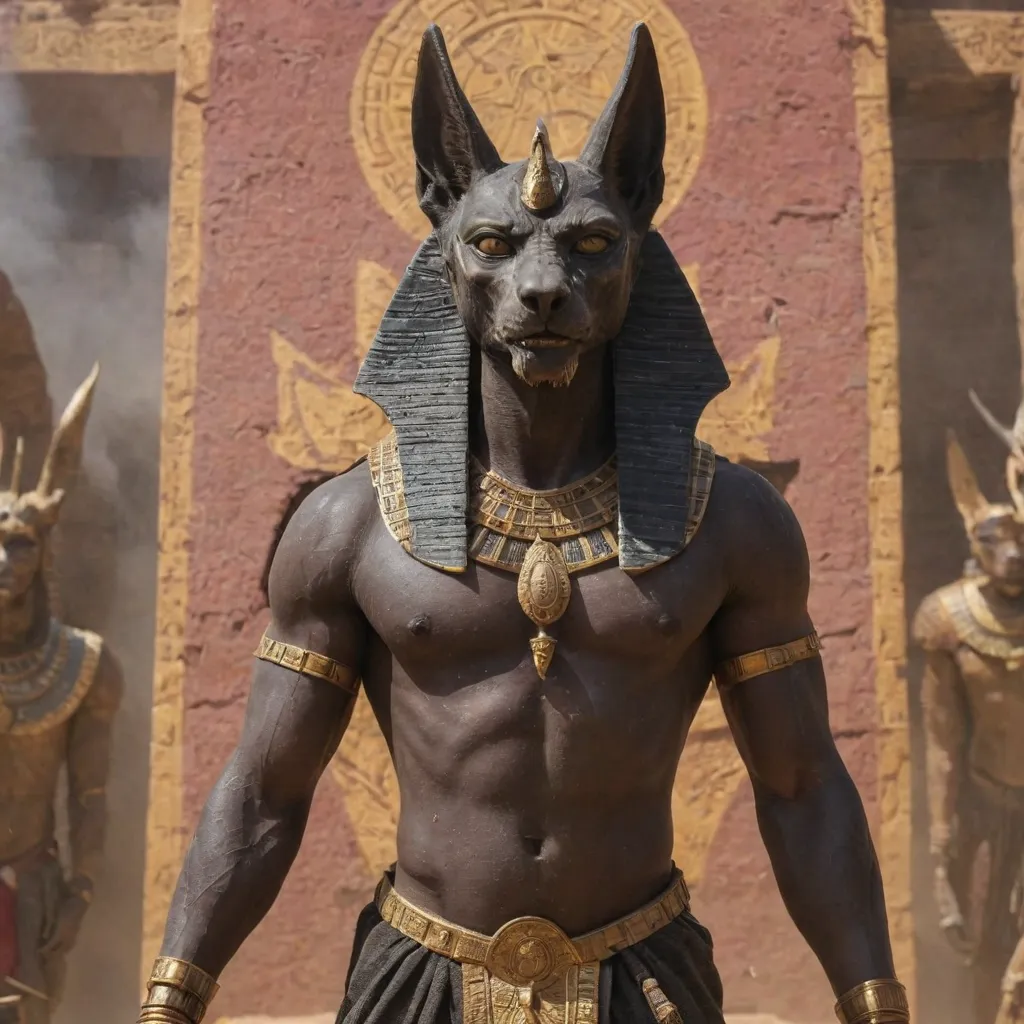
Mysterious Anubis Funerary Rituals
The ancient Egyptians revered Anubis, the jackal-headed god, as the patron of the dead and the embalming process. Anubis played a crucial role in the intricate funerary rituals that accompanied the deceased's journey to the afterlife. These rituals were steeped in symbolism, mythology, and a profound understanding of the human condition.
One of the most significant Anubis-related funerary rituals was the "Opening of the Mouth" ceremony. This elaborate ritual was performed to restore the deceased's ability to speak, eat, and breathe in the afterlife. The ceremony involved the use of special tools, such as the "adze" and the "purification ritual," to "open the mouth" of the mummified body, symbolically restoring its vital functions.
Another important ritual was the "Weighing of the Heart," which took place during the judgement of the dead in the afterlife. In this ritual, the deceased's heart was weighed against the feather of Ma'at, the goddess of truth and justice. If the heart was found to be pure and free of sin, the individual was deemed worthy of eternal life in the afterlife. Anubis was responsible for overseeing this critical judgment, ensuring the deceased's soul was granted access to the afterlife.
The role of Anubis in funerary rites extended beyond the initial burial and mummification process. The god was also invoked during the opening of the tomb, when the deceased's belongings and offerings were placed inside to accompany them on their journey to the afterlife. Anubis was believed to guide and protect the deceased, ensuring their safe passage to the next world.
Interestingly, the use of jackal-headed canopic jars, which were used to store the internal organs of the deceased, was also connected to the cult of Anubis. These jars were believed to house the organs under the protection of Anubis, further emphasizing the god's importance in the funerary rituals of ancient Egypt.
Invoking Anubis for Divination and Prophecy
Invoking Anubis for Divination and Prophecy is a practice steeped in ancient Egyptian mysticism and reverence for the jackal-headed deity. Anubis, the god of the dead, is believed to possess a deep connection to the realm of the unseen, granting those who honor him rare insights into the future and the hidden workings of the universe.
At the heart of this ritual lies the acknowledgment of Anubis' role as the guide of souls, the psychopomp who ushers the deceased into the afterlife. By aligning oneself with this powerful deity, practitioners seek to tap into the vast well of knowledge and wisdom that Anubis is said to possess, allowing them to peer beyond the veil of the physical world and uncover the hidden truths that lie within.
The process of invoking Anubis for divination and prophecy is a delicate and intricate one, often requiring a deep understanding of the deity's symbolism, mythology, and associated practices. Practitioners may engage in elaborate rituals, such as the creation of sacred spaces, the offering of specific items, or the recitation of ancient incantations, all with the aim of establishing a strong connection with Anubis and opening themselves to the revelations he may impart.
Interestingly, the Discover the Surprising Insights of the Anubis Deity offers a deeper exploration of the deity's complex and multifaceted nature, shedding light on the various aspects of Anubis that can be leveraged for divination and prophecy. From his role as the guardian of the dead to his association with the underworld and the afterlife, the article delves into the rich tapestry of Anubis' mythology and its relevance to those seeking to unlock the secrets of the future.
Transformative Anubis Rituals for Spiritual Rebirth
The Egyptian god Anubis, often depicted with the head of a jackal, holds a sacred and enigmatic place in the pantheon of ancient deities. As the patron of the dead and the guide to the afterlife, Anubis' rituals have the power to facilitate profound spiritual transformation and rebirth. Delve into the captivating realm of Anubis' rituals and uncover their profound potential to catalyze personal growth and transcendence.
At the core of Anubis' rituals lies the concept of death and renewal. By confronting the metaphorical "death" of our old selves, we open the door to a profound process of spiritual rebirth. These rituals invite us to let go of limiting beliefs, unhealthy patterns, and the shackles of the ego, allowing us to emerge as our truest, most authentic selves.
One of the most transformative Anubis rituals is the "Rite of the Jackal." This powerful ceremony involves deep meditation, guided visualization, and the invocation of Anubis' presence. Participants are asked to metaphorically "die" to their old selves, shedding the layers of their ego and embracing the unknown. Through this process, they are reborn, with a renewed sense of purpose, clarity, and spiritual connection.
Another captivating Anubis ritual is the "Crossing the Veil" ceremony. This ritual focuses on the threshold between the physical and spiritual realms, allowing practitioners to commune with the realm of the dead and receive guidance from Anubis himself. By stepping into this liminal space, individuals can gain profound insights, unlock suppressed memories, and cultivate a deeper understanding of their own mortality and the mysteries of the afterlife.
Rituals honoring Anubis often incorporate powerful symbolism and sacred objects. The use of black candles, representations of the jackal, and ancient Egyptian motifs can all play a role in these transformative ceremonies. By immersing themselves in this symbolic language, participants can tap into the primal, archetypal energies that Anubis embodies.
It is important to note that engaging in Anubis rituals requires a deep respect for the ancient Egyptian traditions and a willingness to confront the shadow aspects of the self. These rituals are not to be taken lightly, as they can catalyze profound emotional and spiritual changes. Proper preparation, guidance, and a commitment to personal growth are essential for a truly transformative experience.
Anubis Rituals for Honoring the Dead
Anubis, the jackal-headed Egyptian god, has long been associated with the sacred rites of the dead. As the guardian of the underworld and the embalmer of the deceased, Anubis plays a crucial role in the journey of the soul from this life to the next. For those seeking to honor the memory of their loved ones, Anubis-focused rituals can provide a profound and meaningful way to connect with the realm of the departed.
One of the most important Anubis rituals is the "Opening of the Mouth" ceremony, a complex ritual that was performed during the mummification process. This ritual was believed to restore the deceased's senses and faculties, allowing them to once again see, hear, and speak in the afterlife. The ritual involves the use of specialized tools, chants, and invocations to the god Anubis, making it a powerful and symbolic gesture of honoring the dead.
Another important Anubis ritual is the "Weighing of the Heart" ceremony, which was performed during the judgment of the deceased in the afterlife. In this ritual, the heart of the deceased was weighed against the feather of Ma'at, the goddess of truth and justice. If the heart was found to be pure and free of sins, the individual was granted passage into the afterlife. This ritual not only symbolized the importance of living a virtuous life but also the role of Anubis as the gatekeeper to the afterlife.
For those seeking to connect with Anubis on a personal level, rituals such as offerings, prayers, and meditations can be a powerful way to invoke the god's protection and guidance. Many practitioners will leave offerings of black candles, black stones, or even small statues of Anubis at the graves of their loved ones, as a way of acknowledging the god's presence and seeking his aid in the afterlife journey.
Harnessing Anubis' Power for Protection and Purification
Anubis, the ancient Egyptian god of the dead, holds immense power and significance in the realm of spiritual protection and purification. As the guardian of the underworld and the embalmer of the deceased, Anubis' divine influence extends far beyond the realms of the afterlife. Tapping into his essence can provide profound and transformative experiences for those seeking to cleanse their energy, shield themselves from negative forces, and cultivate a deeper connection with the mysteries of the divine.
At the heart of Anubis' protective and purificatory abilities lies his association with the process of mummification. This sacred ritual, which Anubis oversaw, was not merely a physical process but a symbolic journey of the soul. By understanding and applying the principles of mummification, one can harness Anubis' power to shed the metaphorical "dead weight" of the past, release emotional and spiritual blockages, and emerge reborn and rejuvenated.
One of the most potent rituals for harnessing Anubis' power is the "Rite of the Black Jackal." This ceremonial practice invokes the presence of Anubis, drawing upon his guardianship of the underworld and his ability to guide the soul through the challenges of transformation. During this ritual, participants may engage in the following:
- Invoking Anubis through chanting, meditation, or the use of symbolic imagery
- Performing a ritual cleansing, such as a purifying bath or smudging ceremony
- Offering prayers or petitions to Anubis, asking for his protection, guidance, and assistance in the process of personal transformation
- Visualizing Anubis' presence and feeling the weight of his gaze, which can provide a sense of security and empowerment
- Engaging in guided journeying or shamanic practices to connect with Anubis on a deeper level
Another powerful ritual associated with Anubis is the "Opening of the Mouth" ceremony. This ancient Egyptian ritual was performed to revive the senses and faculties of the deceased, allowing them to fully experience the afterlife. In the context of personal spiritual practice, the "Opening of the Mouth" can be adapted to help individuals reconnect with their own innate abilities, senses, and intuition, which may have been dampened or obscured by the weight of worldly concerns.
By incorporating elements of this ritual, such as the use of specific tools (e.g., the "natron" purification substance), the recitation of sacred incantations, and the visualization of Anubis' presence, one can experience a profound sense of cleansing, renewal, and the restoration of their spiritual senses. This can be particularly beneficial for those seeking to overcome mental, emotional, or energetic blockages that have hindered their personal growth and spiritual development.

